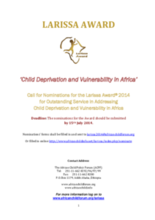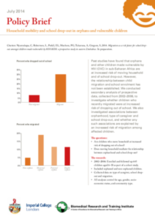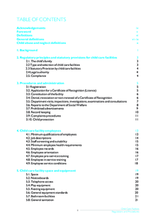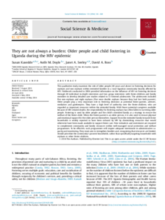Displaying 1231 - 1240 of 1622
The 2014 Larissa Award will go to an initiative that focuses on “Child Deprivation and Vulnerability in Africa”.
The study used pre-existing data on the most vulnerable children’s (MVC’s) and their guardians’ socio-demographic information and the services they received from Pastoral Activities and Services for People With AIDS Dar es Salaam Archdiocese (PASADA) services agency in Tanzania.
This policy brief provides an overview of research from 2002-2006 on whether children in Zimbabwe who recently migrated were at increased risk of dropping out of school, including research questions, findings, and conclusions.
This document contains a set of regulations and procedures which the Zambian Government has established as the “Minimum Standards of Care for Child Care Facilities.”
Faith to Action's latest publication, "Children, Orphanages, and Families: A Summary of Research to Help Guide Faith-Based Action" is now available online
This presentation from Innocenti’s Expert Consultation on Family and Parenting Support describes gender roles in parenting in Ethiopia, the missing role of fathers in parenting, legal/policy provisions of family support, and some work being done to engage fathers.
The video presents a news clip from NTV Kenya reporting on recent changes in Kenyan adoption policy.
This qualitative study examines the role of older people (60 years and above) in fostering decisions for orphans and non-orphans within extended families in a rural Ugandan community heavily affected by HIV.
La terrifiante épreuve d’une fillette reflète ce que vivent des milliers d’enfants emportés par le conflit au Soudan du Sud : séparés de leur famille, ils se retrouvent seuls et ont besoin d’une aide urgente.
Comment les réseaux sociaux solides soutiennent les enfants d’Afrique subsaharienne et leurs familles. Les enfants et les familles vulnérables ont besoin d’un système de soutien social qui réponde aux problèmes qu’ils rencontrent grâce à des solutions efficaces et durables. Les observations présentées dans ce rapport sont un « cliché instantané » des pratiques prometteuses en matière de développement et de pérennité de la communauté.





